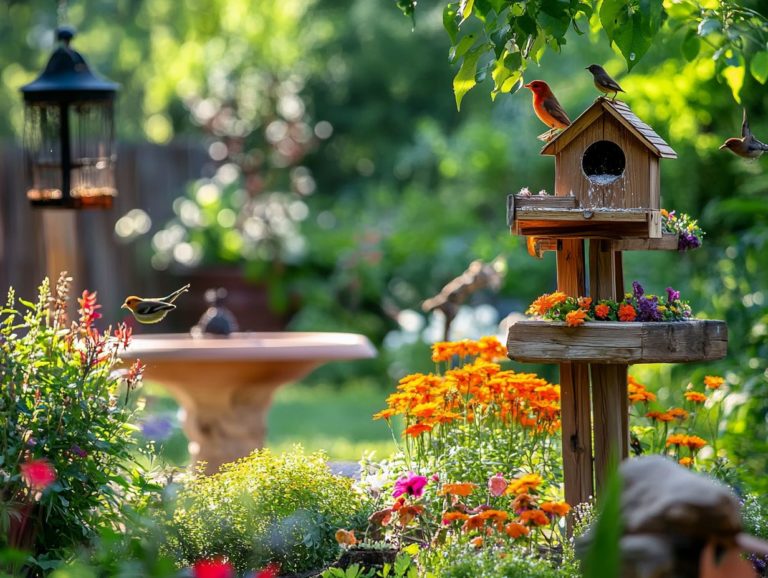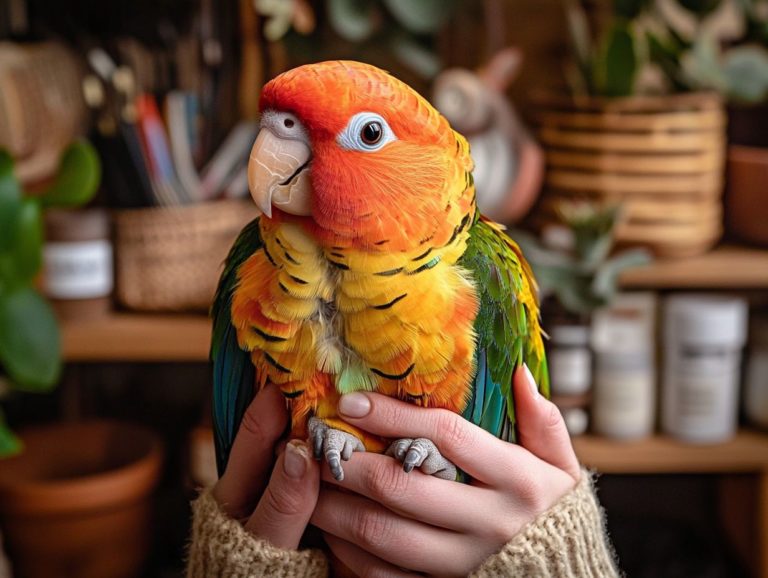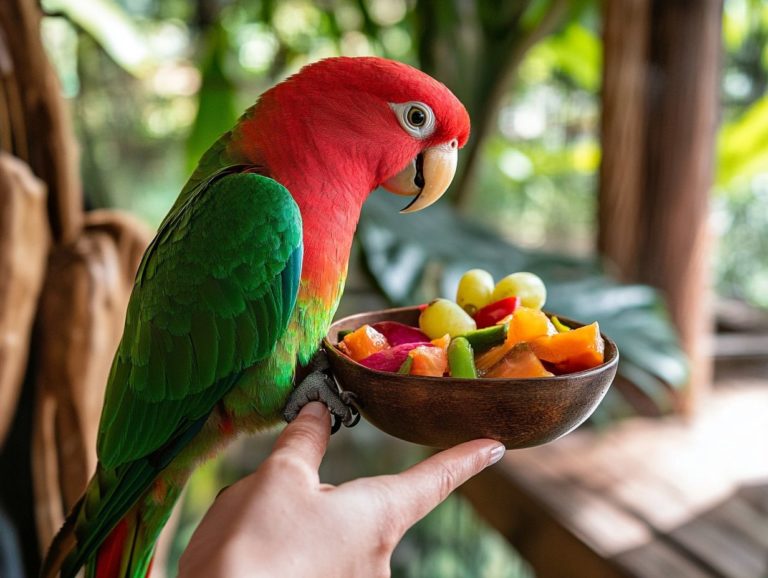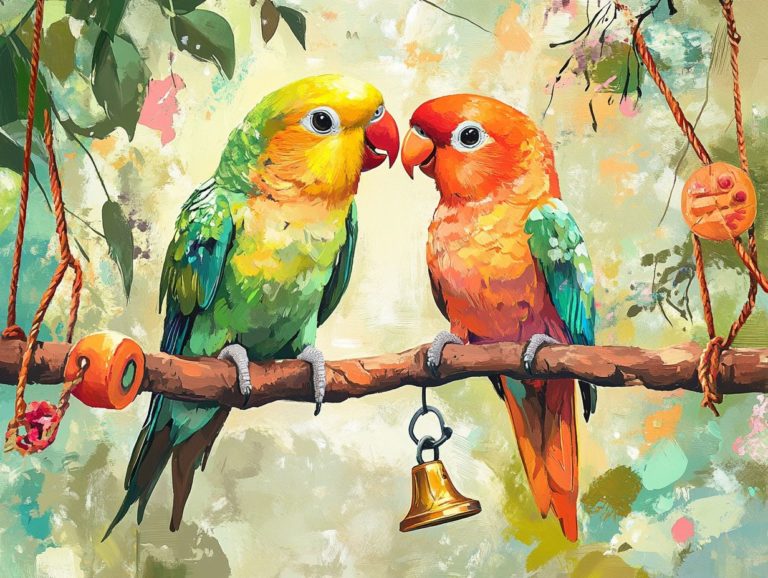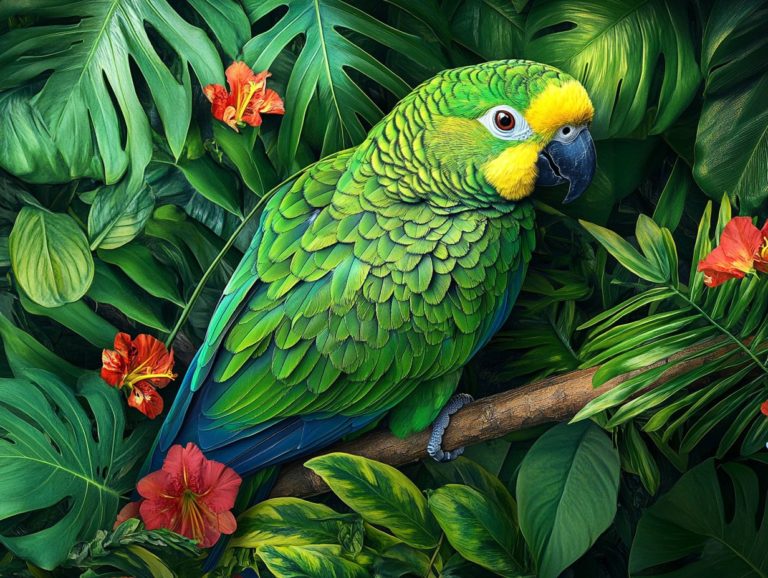Caring for Your Amazon Parrot: A Detailed Guide
Amazon parrots are captivating companions. They are celebrated for their vibrant personalities and remarkable intelligence.
This guide will delve into the essential aspects of caring for these magnificent birds. You ll uncover ways to keep your parrot healthy, explore effective training techniques, and discover tips for nurturing a strong bond with your feathered friend!
Whether you’re a seasoned owner or just stepping into the fascinating world of parrots, this resource will equip you with the knowledge you need to provide the finest care possible.
Contents
- Key Takeaways:
- Setting Up the Perfect Environment
- Feeding Your Amazon Parrot
- Keeping Your Parrot Healthy
- Training and Socializing Your Parrot
- Effective Training Techniques and Socialization Tips
- Creating a Bond with Your Parrot
- Building Trust and Strengthening Your Relationship
- Frequently Asked Questions
- What is an Amazon parrot and why is it important to properly care for one?
- What are the dietary requirements for my Amazon parrot?
- How often should I clean my Amazon parrot’s cage to ensure a healthy living environment?
- Do Amazon parrots require any special grooming?
- What kind of toys should I provide for my Amazon parrot?
- Are there any common health issues, including potential household dangers, I should be aware of with Amazon parrots?
Key Takeaways:
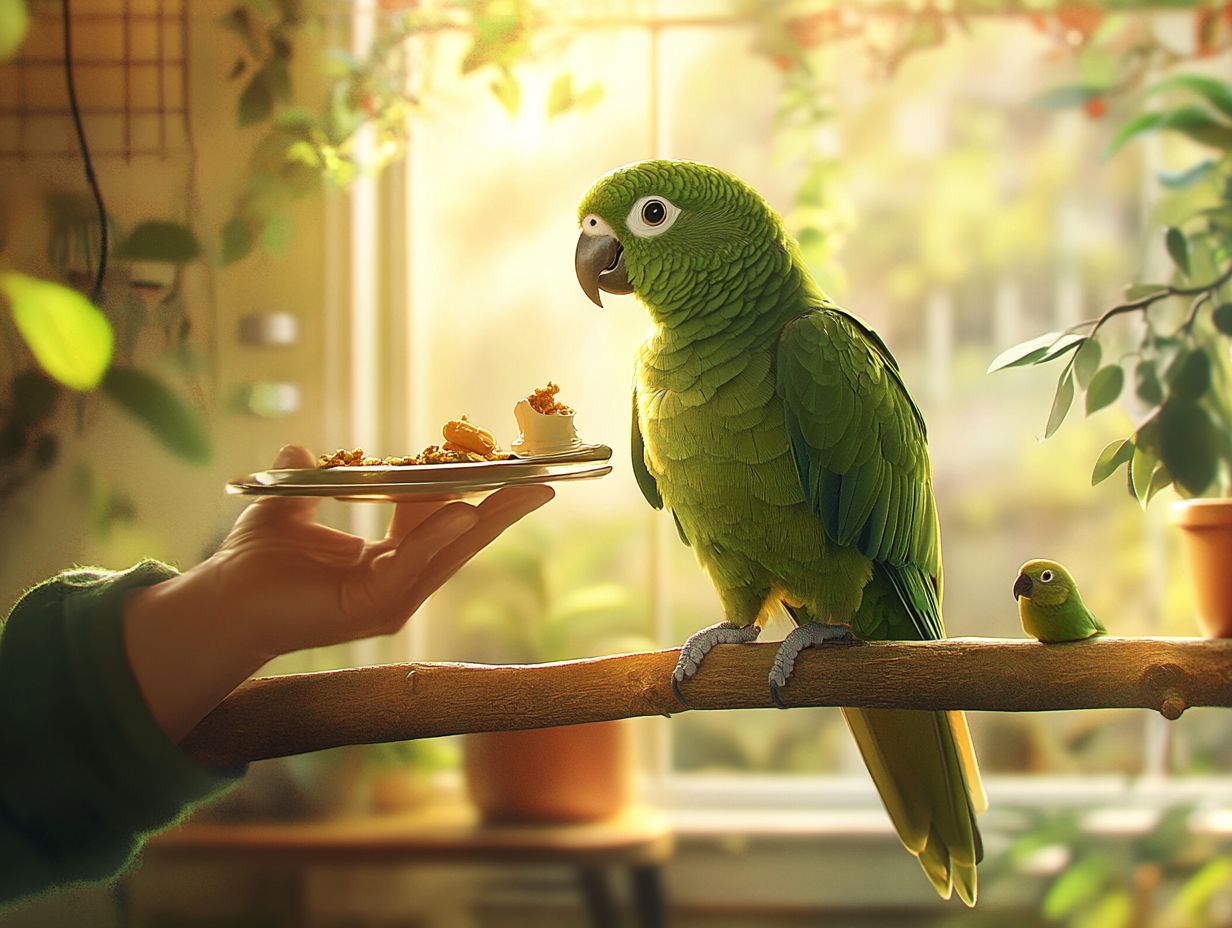
- Providing a spacious and stimulating environment is crucial for your Amazon parrot’s health.
- A nutritious diet is essential for maintaining your parrot’s well-being.
- Proper training and socialization create a strong bond with your happy, well-adjusted parrot.
Overview of Species and Characteristics
The Amazon parrot, a vibrant and intelligent bird from Central and South America, is part of a captivating group of medium-large birds. They are known for their unique feather colors and remarkable vocal skills.
These dynamic creatures have enchanted bird lovers for generations. They boast an impressive lifespan of over 30 years, making them lifelong companions for those fortunate enough to welcome them into their homes.
Understanding the species overview, along with their behaviors and characteristics, is essential for potential pet owners considering this affectionate addition to their households.
Among the most popular species are the double yellow-headed, blue-fronted, and orange-winged Amazons, each with its distinct personality. The double yellow-headed parrot is famous for its striking plumage and sociable nature. It is particularly vocal and often mimics human sounds and phrases, adding a delightful touch to your daily interactions!
Blue-fronted Amazons are equally engaging. They exude a playful demeanor and have a talent for learning tricks, making them captivating companions. Meanwhile, the orange-winged variety may be slightly quieter, but they win over owners with their affectionate behaviors.
To foster a fulfilling relationship, it’s crucial to fully commit to their care needs. This includes a balanced diet, regular social interaction, and mental stimulation. This commitment underscores the importance of responsible pet ownership as you embrace these enchanting feathered friends into your family.
Setting Up the Perfect Environment
Creating the ideal environment for your Amazon parrot is essential for their happiness and health. For these remarkable birds, understanding essential care for adopted parrots is crucial, as they have specific housing needs that cater to their social nature and the potential dangers they may encounter at home!
A thoughtfully designed Amazon parrot enclosure serves as a safe haven while also encouraging their need for social interaction and physical activity both vital for their overall well-being.
Housing, Cage Size, and Perch Placement
When selecting housing for your Amazon parrot, it s essential to choose an enclosure that meets their exercise needs. Ensure comfort through the right size and perch placement. A spacious cage allows these lively birds to move freely, while strategically placed perches at different heights create an engaging environment that encourages climbing and exploration.
For larger species, like the Blue-Fronted Amazon, aim for a cage that measures at least 4 feet high, 3 feet wide, and 2 feet deep; smaller species can thrive in slightly less space.
Opt for perches made from natural wood to promote healthy foot care and stave off boredom. Varying thicknesses provide different gripping challenges, enhancing their overall physical fitness!
Incorporating toys and foraging opportunities is key for mental stimulation. This leads to a healthier and happier parrot. Ensuring that the cage is enriched with interactive elements addresses their physical needs and supports their emotional well-being.
Feeding Your Amazon Parrot
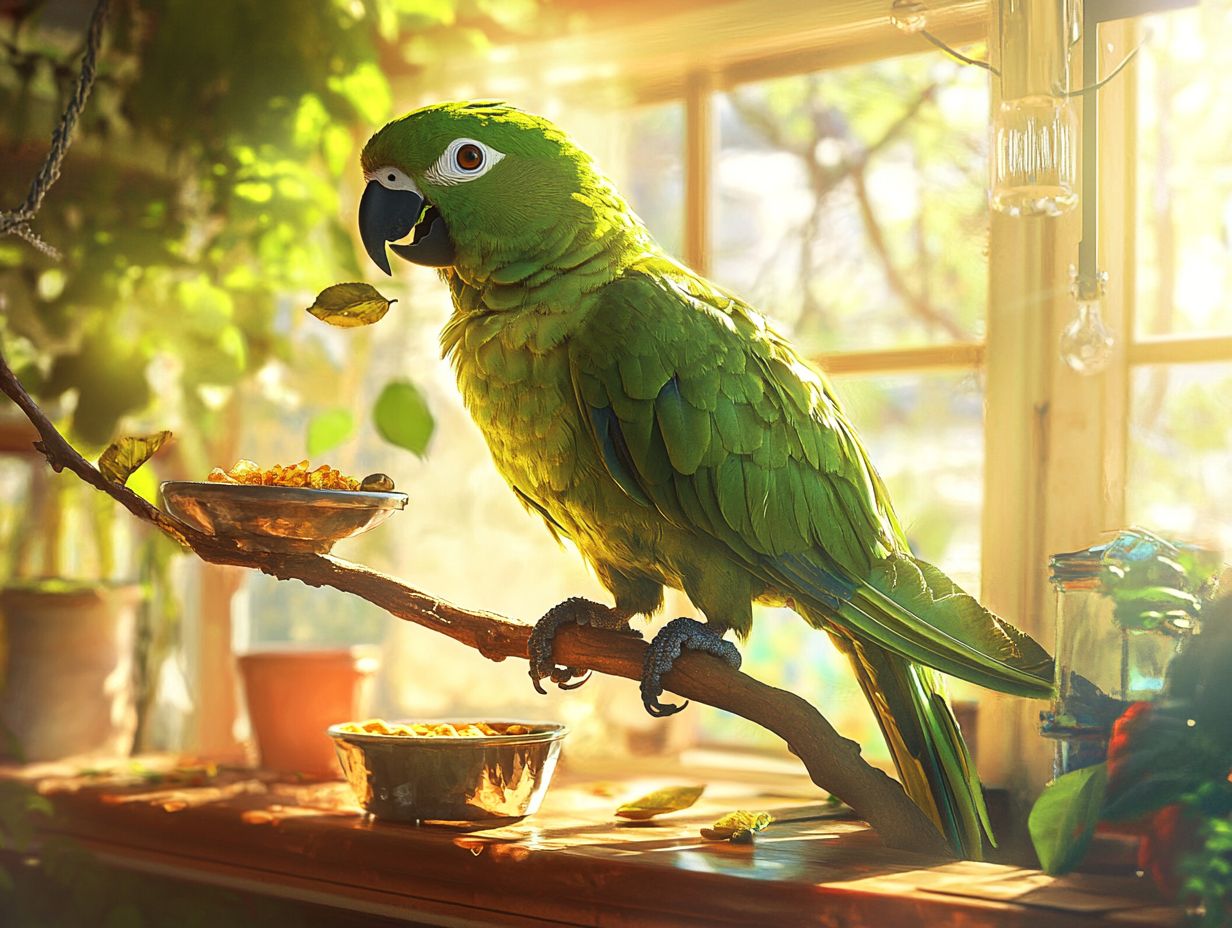
Feeding your Amazon parrot a well-balanced and varied diet is crucial for maintaining its health and vitality. These birds have specific diet needs that require careful choices of healthy vegetables and suitable commercial diets.
By establishing a consistent feeding schedule, you promote optimal nutrition while catering to their behavioral needs and social eating habits. This attention to detail enhances their overall well-being and happiness.
Dietary Needs and Nutritional Requirements
Understanding the dietary needs and nutritional requirements of your Amazon parrot is essential for preventing common health problems. A balanced diet includes fresh fruits, vegetables, and high-quality pellets like Roudybush or Soluvite D. This is essential for their well-being.
Specific vitamins like A, D3, and E promote healthy feather development and robust immune function. Essential minerals such as calcium and phosphorus are also crucial for strong bones and overall vitality.
Each parrot may have unique needs. Consult with an avian veterinarian to receive tailored dietary advice, ensuring your parrot gets the right balance of nutrients. This proactive approach helps mitigate potential health issues.
By integrating these practices, you cultivate a resilient bird and enrich the bond you share with your feathered friend.
Keeping Your Parrot Healthy
Keeping your Amazon parrot healthy is exciting and rewarding! You can ensure a vibrant life with just a bit of effort. Understanding potential issues like respiratory problems and dietary deficiencies is key, and for those considering other species, exploring care tips for a Quaker parrot can also provide valuable insights.
Don t wait! Schedule regular check-ups with an avian veterinarian to catch any health issues early. This allows you to ensure that your feathered friend stays vibrant and full of life.
Prioritizing their health today means enjoying many joyful moments with your lively companion tomorrow.
Common Health Concerns and How to Address Them
Common health concerns for Amazon parrots can vary from nutritional deficiencies to behavioral issues. Knowing how to tackle these problems is essential for maintaining a harmonious home.
Regular consultations with an avian veterinarian help you identify symptoms of common diseases early, enabling timely intervention and behavioral training to enhance their overall well-being.
It s important to recognize issues like feather plucking, which may arise from stress or boredom, and obesity, often a result of an improper diet. Grab a pet care guide today to discover nutrient-rich diets and fun activities for your parrot!
For instance, incorporating puzzle toys can engage their minds and help reduce anxiety-related behaviors. Monitoring their weight through regular check-ups is vital, as obesity can lead to serious health complications. By taking these proactive steps, you can enhance your feathered friend s quality of life and longevity.
Training and Socializing Your Parrot
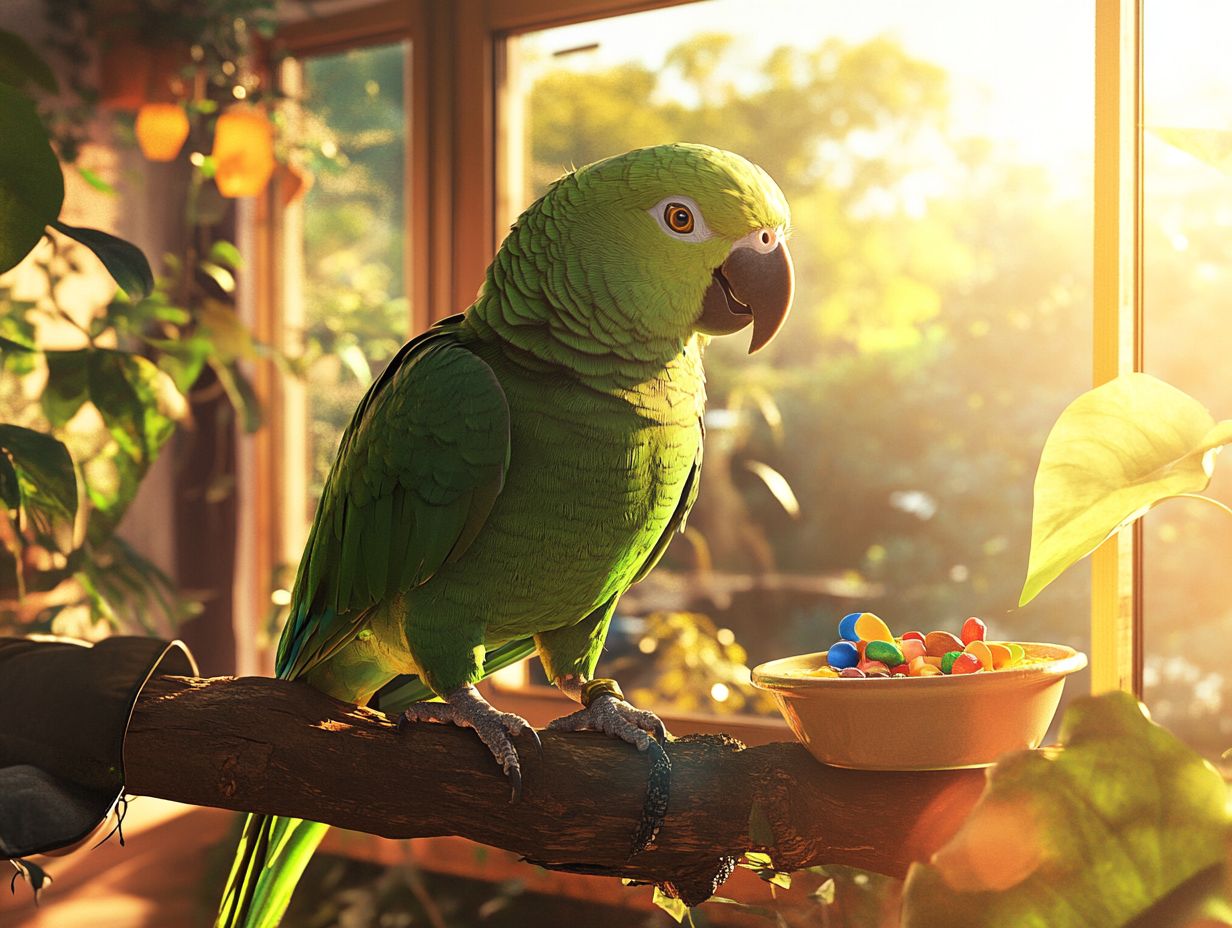
Training and socializing your Amazon parrot are vital components of responsible pet ownership. These captivating birds crave interaction and mental stimulation, thriving on the attention you provide.
By employing effective training techniques, you reinforce positive behaviors and deepen the bond between you and your parrot, transforming them into well-mannered members of your household.
Effective Training Techniques and Socialization Tips
Effective training techniques for your Amazon parrot hinge on positive reinforcement and consistent practice. This approach ensures they respond well to commands while enjoying social interactions.
Engaging in enrichment activities not only enhances training but also supports their mental well-being. This fosters a trusting relationship between you and your parrot.
By incorporating various training methods, you can significantly elevate your parrot’s learning experience. Command training lays the groundwork for communication, enabling your parrot to grasp essential cues. Socialization exercises create meaningful interactions that reduce anxiety and build confidence in new environments.
Using toys creatively serves as a powerful enrichment tool, sparking curiosity and encouraging problem-solving. These activities fulfill your parrot’s behavioral needs and strengthen the bond you share, transforming the training process into an enjoyable and effective journey.
Creating a Bond with Your Parrot
Start building an amazing bond with your Amazon parrot today! This rewarding journey demands patience, understanding, and consistent interaction. Investing time and effort helps forge trust and deepens your relationship.
Engaging in meaningful social interaction and offering mental stimulation caters to their attention-seeking nature. This cultivates a profound connection that enriches both your lives.
Building Trust and Strengthening Your Relationship
Building trust with your Amazon parrot is essential for cultivating a strong relationship. It all starts with creating a safe environment where they feel secure and comfortable.
Consistent social interaction and reward-based training encourage your parrot to engage and bond with you, ensuring a fulfilling companionship.
Understanding your parrot’s body language is crucial in this journey. By observing their movements and vocalizations, you can accurately gauge their comfort level and emotional state.
Providing a serene space, free from loud noises and sudden movements, significantly enhances their sense of security, paving the way for open communication.
Employing safe handling techniques like supporting their feet and allowing them to step onto your hand voluntarily will help build trust over time. This approach transforms daily interactions into positive experiences, reinforcing the bond and ensuring your Amazon parrot feels valued and understood.
Frequently Asked Questions
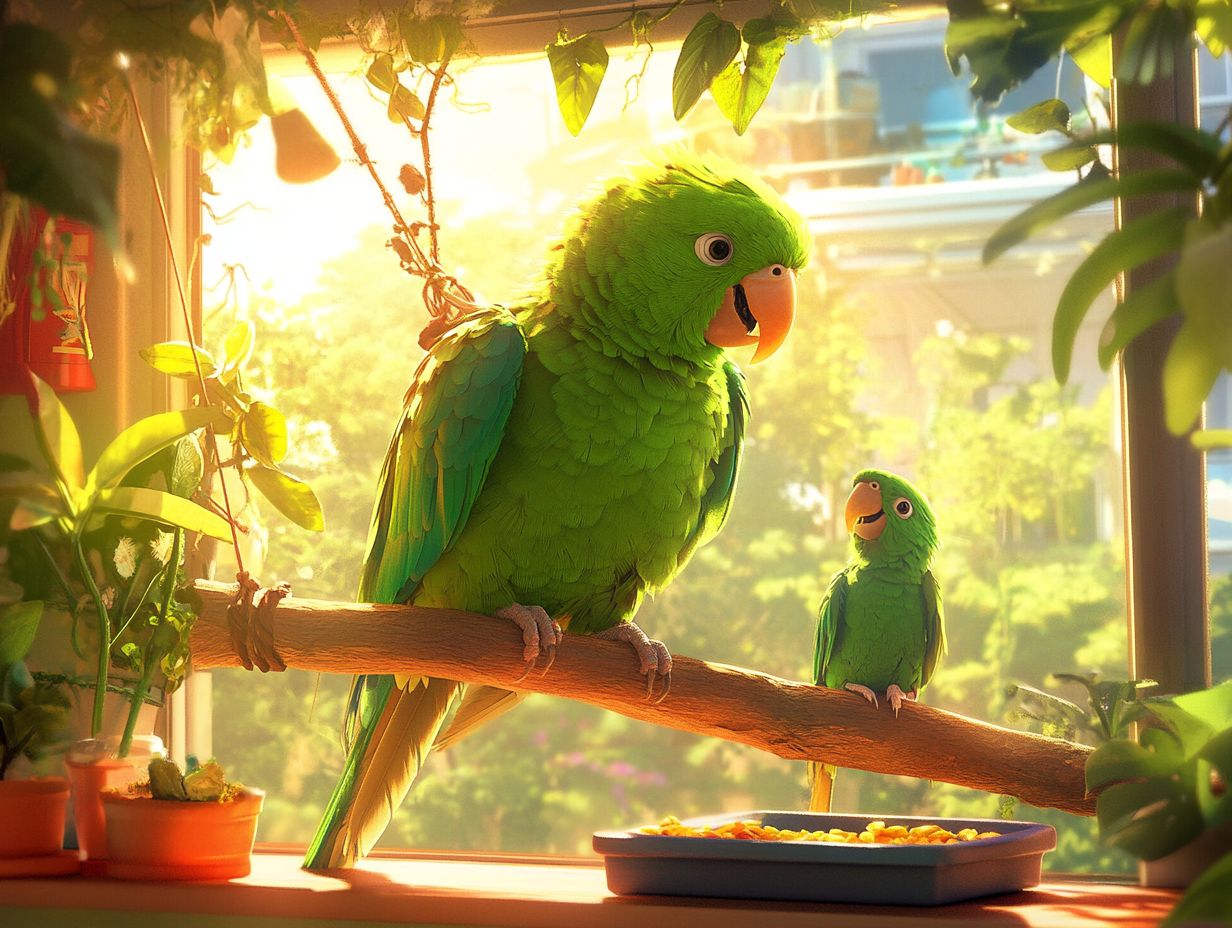
What is an Amazon parrot and why is it important to properly care for one?
An Amazon parrot is a popular pet bird known for its intelligence and colorful plumage. Proper care, including understanding their diet and nutrition, is essential to ensure its health, happiness, and longevity as a pet. For detailed information, check out this complete guide on lovebird nutrition.
What are the dietary requirements for my Amazon parrot?
- A variety of fresh fruits
- Vegetables
- High-quality pellets formulated specifically for the species
- Treats like nuts and seeds in moderation
How often should I clean my Amazon parrot’s cage to ensure a healthy living environment?
It is recommended to clean your Amazon parrot’s cage at least once a week, or more frequently if necessary. This includes replacing any soiled bedding, wiping down surfaces, and providing fresh food and water.
Do Amazon parrots require any special grooming?
Yes, Amazon parrots require regular nail trims and beak trims. Nail trimming can be done every 4-6 weeks, while beak trimming should only be done by a professional if necessary.
What kind of toys should I provide for my Amazon parrot?
- Puzzles
- Chewing toys
- Foraging toys
Providing a variety of toys is crucial to keep them mentally and physically stimulated.
Start your journey of trust-building today, and watch your parrot thrive!
Are there any common health issues, including potential household dangers, I should be aware of with Amazon parrots?
Yes, Amazon parrots can have health issues like vitamin deficiencies, respiratory infections, and feather plucking.
Regular vet check-ups and a balanced diet can prevent these problems. Act now to ensure your parrot’s health and happiness!

